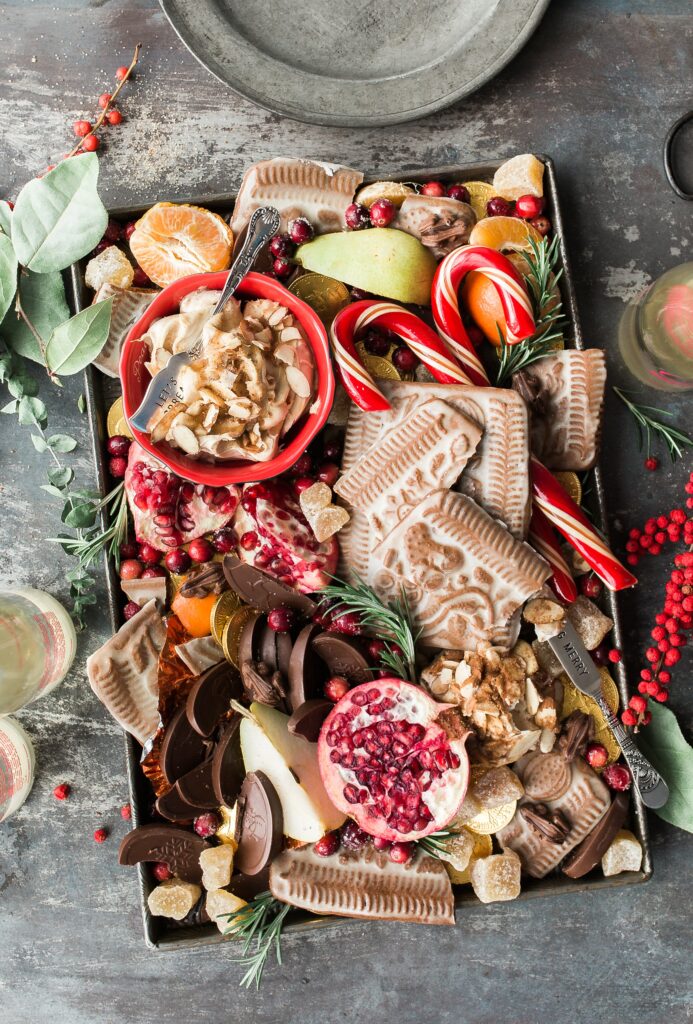The holiday season is upon us. And what should be a celebratory time is often accompanied by a bitter note of stress. We’re no strangers to navigating complex family dynamics, dodging intrusive questions from relatives, and the general anxiety of seeing people we haven’t seen in forever. On top of that, the holidays can be extra stressful because of diet culture. There’s an emphasis to healthify this, don’t lose sight of your exercise routine, prep for a juice cleanse in January, etc.

For those struggling with body image, these messages are particularly toxic. They quickly put a significant damper on holiday festivities. As someone who’s fallen victim to diet culture in the past, today I’m sharing helpful tips to navigate food and body image during the holidays. I’m sharing how to have a healthy holiday season—one that’s rooted in self-compassion, presence, and kindness.
Say no to diet culture
Raise your hand if you’ve felt (or currently feel) victimized by diet culture. Especially during the holidays. The problem with these nuanced messages is that in the grand scheme of things, the holidays are a very short time span. A blip on the radar. And truthfully, life is too short not to enjoy your neighbor’s homemade gingerbread cookies, Bûche de Noël, and every other delicious, holiday-inspired dish. Yes, you can care about your health and eat Christmas cookies, too.
Take an INTUITIVE EATING approach
In essence, the holidays are an opportune time to take an intuitive eating approach—a philosophy of eating that makes you the expert of your body and its hunger signals. It’s about honoring your unique nutritional needs, food preferences, lifestyle, etc. New to intuitive eating? You can read more about it, here. Essentially, it’s the opposite of a traditional diet. It doesn’t impose guidelines about what to avoid and what or when to eat. Instead, it teaches that you are the best person (the only person!) to make those choices.

eNjoy everything in moderation
The holiday season can be a minefield when it comes to diet culture. Some people eat less in order to eat more later, or beat themselves up internally after eating a second slice of pie. Or, they schedule a two-hour long workout the morning after Christmas to compensate for any ‘extra’ calories from the previous day’s meals. Unfortunately, we’ve been conditioned to think we’re supposed to have tight control over our food intake and exercise regimen. Furthermore, the holidays are a time we get to ‘splurge,’ and eat all our favorite foods—and then we have to ‘get back on track’ in the new year. This entire mentality is backwards, unhealthy, unsustainable, and stressful.
Mindfulness is key
Instead, use the holiday season as an opportunity to utilize the principles of intuitive eating. You don’t have to allow diet culture to interfere with your holiday enjoyment. Partake in eating your favorite foods without guilt, appreciate the time you have with the people you love, and be mindful about doing whatever makes you feel good. For example, if movement helps you feel more at ease, prioritize joyful exercise. Just remember, it doesn’t have to be long or intense in order to be effective. And when possible, try to balance your blood sugar. Meaning, pair Christmas morning’s cinnamon roll with scrambled eggs or Greek yogurt. You’ll feel less of a sugar high and more even-keeled energy throughout the morning.
6 tips to have a healthy holiday season
Below are tips to have a healthy holiday season—without feeling restricted or deprived.
1. The holidays are meant to be a time of celebration. Enjoy them! Keep your traditions alive, eat the foods you love eating, and celebrate with the people you care about. For a moment, imagine if this was your last Christmas. Would you hold back? No. You would live in the moment, feeling immense gratitude for the time you have to experience delicious, crave-worthy foods.
2. Diet culture demonizes holiday eating and holiday indulgences. In many ways, this to make you feel guilty and turn to diets, meal plans, and supplements in the new year. Remember to take a step back. Zoom out. As mentioned, this is such a short period. You deserve celebration, joy, and happiness without needing to make up for it.
3. Fasting or restricting before (and after) the holidays keeps you trapped in a restrictive cycle. It encourages the all-or-nothing mentality. This leads to feeling addicted and obsessive around food. Eat normally and enough the day before Christmas, and the days after! You still need (and deserve) food. Always. There is no such thing as empty or useless calories.
4. You don’t have to healthify any Christmas foods. You are allowed to not replace any of the ingredients in soft, sweet sugar cookies. In fact, having the real deal can bring more pleasure and satisfaction. Deprivation is not the goal.
5. Just as you can say yes to what you want, you can also say no to what you don’t want. Setting boundaries during the holiday season is key. Truthfully, it’s something we should all be practicing a bit more. Take rest when you need it, say no to things you don’t enjoy, and step out of conversations that are not serving you.
6. Everybody eats differently. We all require different amounts of food. Resist the urge to measure or compare your eating habits to others. It only ends up affecting you. Remember, the point of life is not to eat less. Eating less than what you require will lead to low energy, irritability, poor sleep, hormone imbalances, and more. Instead, lean into eating enough—without guilt—to feel fully satisfied this holiday season.
Images courtesy of Unsplash.



Leave a Reply